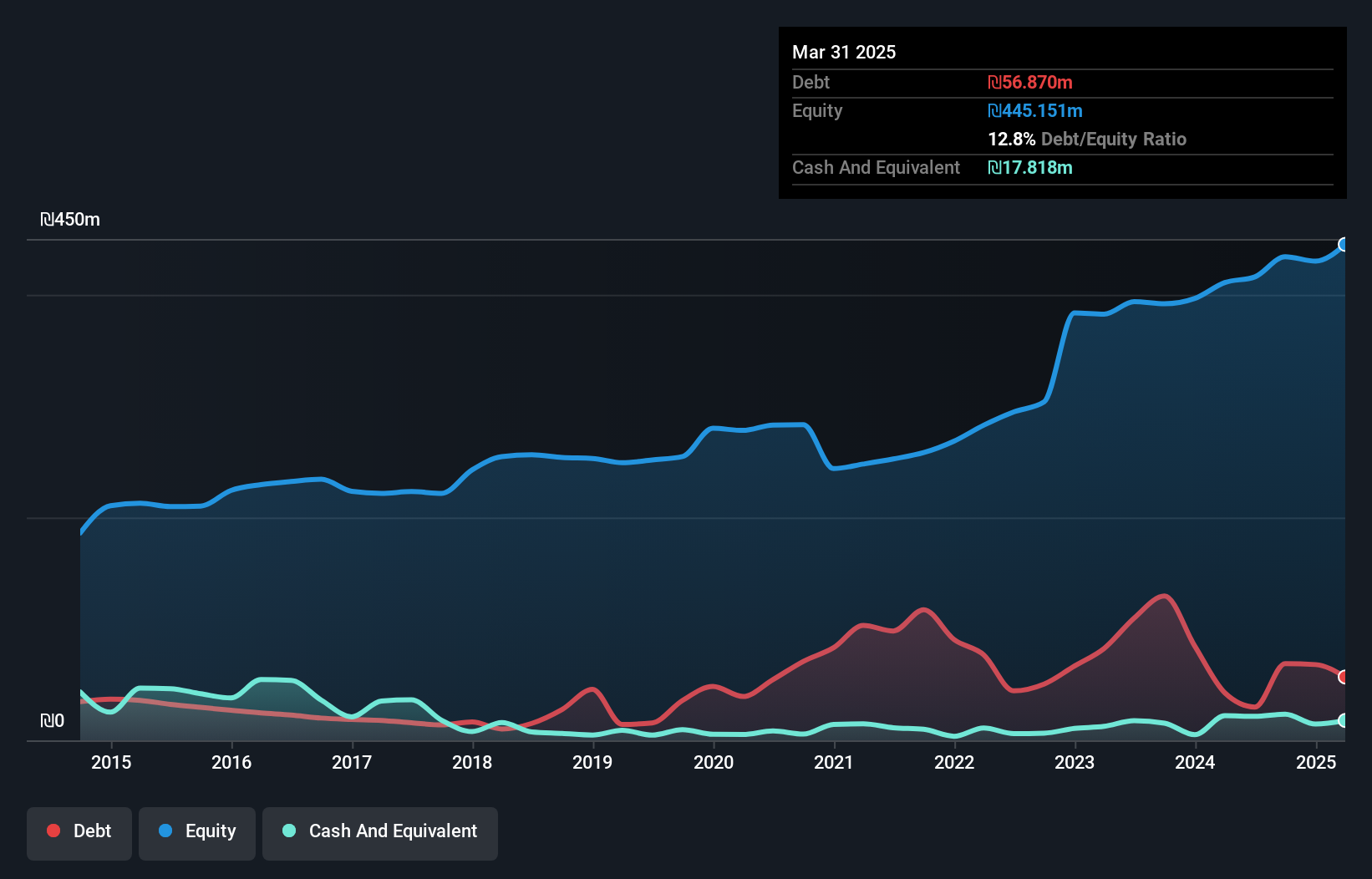- Israel
- /
- Aerospace & Defense
- /
- TASE:ASHO
Ashot Ashkelon Industries (TLV:ASHO) Could Easily Take On More Debt
Warren Buffett famously said, 'Volatility is far from synonymous with risk.' It's only natural to consider a company's balance sheet when you examine how risky it is, since debt is often involved when a business collapses. Importantly, Ashot Ashkelon Industries Ltd. (TLV:ASHO) does carry debt. But the more important question is: how much risk is that debt creating?
What Risk Does Debt Bring?
Debt and other liabilities become risky for a business when it cannot easily fulfill those obligations, either with free cash flow or by raising capital at an attractive price. Part and parcel of capitalism is the process of 'creative destruction' where failed businesses are mercilessly liquidated by their bankers. However, a more common (but still painful) scenario is that it has to raise new equity capital at a low price, thus permanently diluting shareholders. Having said that, the most common situation is where a company manages its debt reasonably well - and to its own advantage. When we think about a company's use of debt, we first look at cash and debt together.
How Much Debt Does Ashot Ashkelon Industries Carry?
You can click the graphic below for the historical numbers, but it shows that as of March 2025 Ashot Ashkelon Industries had ₪56.9m of debt, an increase on ₪42.5m, over one year. However, because it has a cash reserve of ₪17.8m, its net debt is less, at about ₪39.1m.

How Healthy Is Ashot Ashkelon Industries' Balance Sheet?
According to the last reported balance sheet, Ashot Ashkelon Industries had liabilities of ₪280.3m due within 12 months, and liabilities of ₪71.7m due beyond 12 months. Offsetting this, it had ₪17.8m in cash and ₪193.0m in receivables that were due within 12 months. So its liabilities total ₪141.1m more than the combination of its cash and short-term receivables.
Given Ashot Ashkelon Industries has a market capitalization of ₪1.51b, it's hard to believe these liabilities pose much threat. However, we do think it is worth keeping an eye on its balance sheet strength, as it may change over time.
See our latest analysis for Ashot Ashkelon Industries
We measure a company's debt load relative to its earnings power by looking at its net debt divided by its earnings before interest, tax, depreciation, and amortization (EBITDA) and by calculating how easily its earnings before interest and tax (EBIT) cover its interest expense (interest cover). This way, we consider both the absolute quantum of the debt, as well as the interest rates paid on it.
With net debt sitting at just 0.53 times EBITDA, Ashot Ashkelon Industries is arguably pretty conservatively geared. And this view is supported by the solid interest coverage, with EBIT coming in at 9.1 times the interest expense over the last year. In addition to that, we're happy to report that Ashot Ashkelon Industries has boosted its EBIT by 36%, thus reducing the spectre of future debt repayments. The balance sheet is clearly the area to focus on when you are analysing debt. But you can't view debt in total isolation; since Ashot Ashkelon Industries will need earnings to service that debt. So when considering debt, it's definitely worth looking at the earnings trend. Click here for an interactive snapshot.
Finally, while the tax-man may adore accounting profits, lenders only accept cold hard cash. So we clearly need to look at whether that EBIT is leading to corresponding free cash flow. During the last three years, Ashot Ashkelon Industries produced sturdy free cash flow equating to 66% of its EBIT, about what we'd expect. This cold hard cash means it can reduce its debt when it wants to.
Our View
Happily, Ashot Ashkelon Industries's impressive EBIT growth rate implies it has the upper hand on its debt. And that's just the beginning of the good news since its net debt to EBITDA is also very heartening. Zooming out, Ashot Ashkelon Industries seems to use debt quite reasonably; and that gets the nod from us. While debt does bring risk, when used wisely it can also bring a higher return on equity. There's no doubt that we learn most about debt from the balance sheet. However, not all investment risk resides within the balance sheet - far from it. For example - Ashot Ashkelon Industries has 1 warning sign we think you should be aware of.
At the end of the day, it's often better to focus on companies that are free from net debt. You can access our special list of such companies (all with a track record of profit growth). It's free.
New: Manage All Your Stock Portfolios in One Place
We've created the ultimate portfolio companion for stock investors, and it's free.
• Connect an unlimited number of Portfolios and see your total in one currency
• Be alerted to new Warning Signs or Risks via email or mobile
• Track the Fair Value of your stocks
Have feedback on this article? Concerned about the content? Get in touch with us directly. Alternatively, email editorial-team (at) simplywallst.com.
This article by Simply Wall St is general in nature. We provide commentary based on historical data and analyst forecasts only using an unbiased methodology and our articles are not intended to be financial advice. It does not constitute a recommendation to buy or sell any stock, and does not take account of your objectives, or your financial situation. We aim to bring you long-term focused analysis driven by fundamental data. Note that our analysis may not factor in the latest price-sensitive company announcements or qualitative material. Simply Wall St has no position in any stocks mentioned.
About TASE:ASHO
Ashot Ashkelon Industries
Manufactures and sells systems and components for aerospace and defense in Israel and internationally.
Flawless balance sheet with proven track record.
Market Insights
Community Narratives



